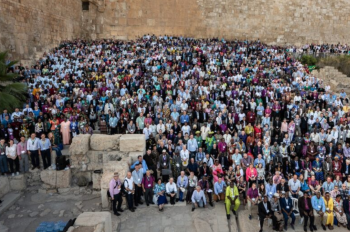
Amid rising immigration to Canada—where one in four residents is foreign-born—nine church pastors have offered candid insights into how governments can better support immigrant integration, emphasizing the often-overlooked role of faith communities as trusted bridges between newcomers and Canadian society.
Their perspectives were published in a new research report by Cardus, a Christian nonpartisan think tank based in Ontario, which calls for closer collaboration between government agencies and churches to address language barriers, systemic inefficiencies, and socioeconomic pressures facing migrant communities.
The report, titled How Governments Can Better Support Immigrants’ Integration: Insights from Church Leaders, was published in April 2025. It argues that stronger, more coordinated partnerships between government agencies and faith communities are essential for effectively integrating immigrants into Canadian society.
The unnamed pastors, surveyed in 2024, lead churches with levels of migrant diversity in British Columbia and Ontario, representing a selection of urban and suburban congregations of varying numbers of members. The churches are an array of evangelical, mainline protestant, oriental orthodox, eastern catholic and roman catholic.
“Pastors, priests and other church leaders are often on the frontlines of welcoming immigrants to Canada,” said Bennett, one of the report’s authors, in a news update for Church for Vancouver.
“They can provide cultural and spiritual insights that governments would otherwise miss, they can advocate for marginalized groups in unique ways, and they can encourage communication between immigrant communities and government agencies.”
According to the church pastors, immigrants face challenges in the areas of fear and uncertainty about trusting any engagement with government services, leaving barriers to obtaining needed support and leaving them vulnerable. Similar limitations for accessing these services were observed by the pastors with language barriers, deemed a “pervasive issue across the congregations surveyed.”
Limited English skills makes understanding terminology on government websites difficult. Ukrainians, in particular, often find Google Translate inaccurate, one of the pastors reported.
Talking over the phone is also a general challenge for migrants because of difficulties understanding accents.
Systemic issues are a third prevailing issue, according to the church leaders, with problems such as dealing with the bureaucracy for getting permanent residency and coping with culturally different western mindsets, which are hard to understand: “Immigrants grapple with complex bureaucratic systems, health care inaccessibility, and the general challenges of integrating into the socioeconomic, civic, and cultural fabric of Canadian society,” stated the report.
“Socioeconomic strains” were a fourth area of concern by the pastors. Immigrants are affected by high housing costs and underemployment in Canada. For migrants working hard to “stay afloat,” it leaves little time to find space to engage with government agencies. One of the pastors noted that for natural-born Canadians this can be an issue but it is compounded for immigrants because of the language barriers and other issues noted above.
“These challenges, rooted in fear, language barriers, systemic inefficiencies, and socioeconomic pressures, highlight the complex realities that immigrant parishioners face,” noted the report, adding: “Faith leaders are uniquely positioned to advocate for their communities, bridging gaps and fostering resilience in the face of these obstacles.”
The crucial role of churches in supporting communities of immigrants and “bridging gaps between newcomers and Canadian society” is underlined in the report.
Pastors made several recommendations for government agencies to heed in respect of collaborating better with churches and faith communities in serving migrants.
The report noted a desire by the pastors for government agencies to utilize the goodwill of churches and partner with them: “Governments at all levels should recognize churches and other faith communities as trusted partners in immigrant integration.”
Other recommendations by the church leaders included streamlining the administration needed for bureaucratic processes to deal with the systemic barriers suffered by immigrants.
Similarly, the pastors want the government to simplify permanent residency applications with clearer expectations of timelines, such as when a Visa will arrive.
Language support programs must also be expanded, the pastors stated, so that services for migrants can be improved such as the provision of employed translators.
Government agencies were also encouraged to be more transparent in communications for delivering services, which can “reduce frustration and build trust among immigrant communities.”
Pastors surveyed also sought more funding and resources so that churches can expand their programs for immigrants such as job training and assistance for housing. Creating employmet and making accommodation affordable is another need.
“The testimonies of these pastors underscore the vital role that Canadian churches play as hubs of cultural promotion, integration, and community building,” stated the research paper.
“By addressing both the spiritual and practical needs of immigrants, these churches help them navigate life in a new country while fostering connections with their religious and cultural heritage.
"This dual role solidifies their importance as bridges linking diverse newcomers to Canadian society more broadly.”
In conclusion, the report saw religious diversity in Canada as both a “gift and opportunity.”
“Churches and other faith communities are trusted institutions within immigrant communities, serving as bridges between immigrants and broader society. They provide invaluable support in addressing spiritual, social, and systemic challenges at the most local level.”
Both government agencies and church leaders “can and should” be in partnership to achieve a shared goal of “building a society in which everyone can thrive.”
“By encouraging collaboration, simplifying processes, and enabling faith communities as key partners in immigrant integration, Canada can ensure that our public square reflects the ideals of inclusivity and compassion—all buttressed by religious freedom.”





